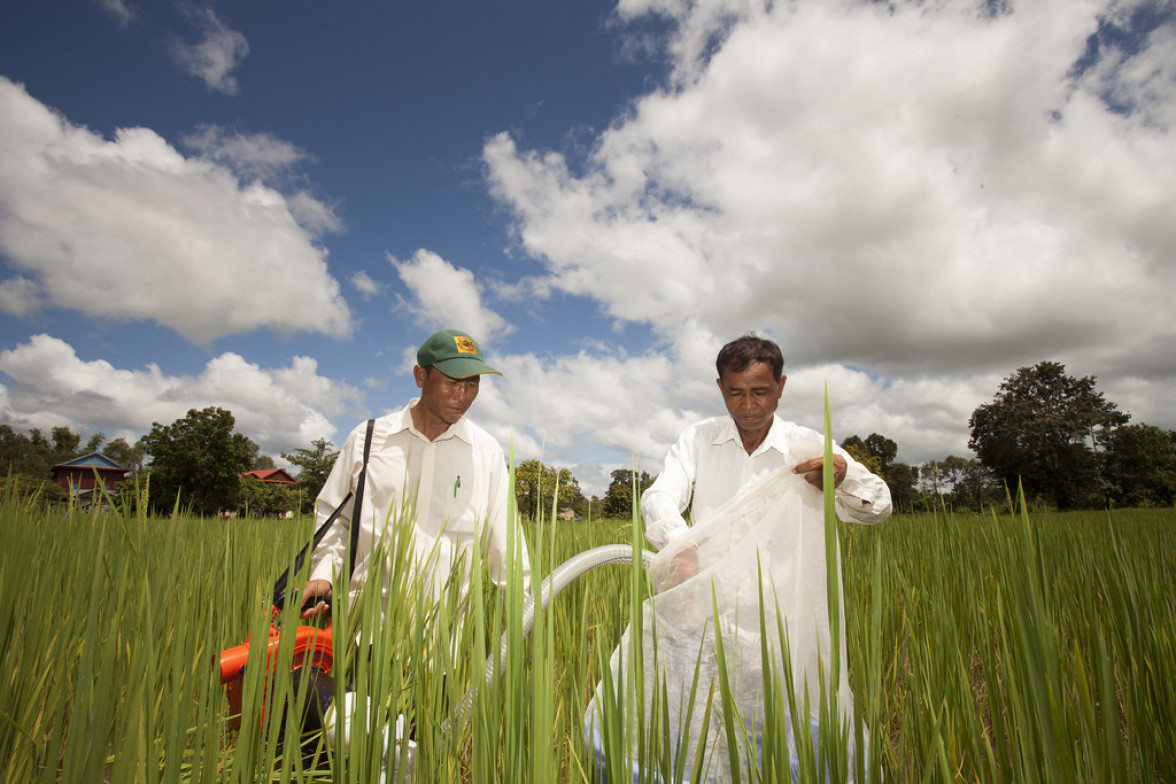
Why Cambodia Should Promote More Sustainable Business Practices?

Written by: Yin Verak, a 3rd year student majoring in Business Administration at Paññāsāstra University of Cambodia
Edited by: Sao Phal Niseiy, Editor-in-Chief at The Cambodianess and Deputy Editor-in-Chief at Thmey Thmey News

(Photo Credit: "Researchers in a rice field in Cambodia" by IFPRI is licensed under CC BY-NC-ND 2.0)
The world has begun to recognize the need to keep business profitable while minimizing the negative environmental impacts. Therefore, the concept of sustainable business becomes more and more significant for many countries across the world, including developing countries. Cambodia, in particular, has some businesses that try to embrace the sustainability concept. The actions include management of waste as well as promotion of clean and green initiatives and eco-friendly businesses.
These can be a part of innovative solutions to help and reduce environmental problems in Cambodia, enabling us to repair the environmental damages resulting from our poor environmental performance. According to the Environmental Performance Index (EPI) in 2020, Cambodia was ranked 139 out of 180 countries, with a score of 33.6.
Global warming has been growing as one of the most scorching topics for global leaders to discuss and seek practical solutions as many countries have already been struggling to deal with the adverse effects of this disastrous problem.
The level of global temperature has been increasing noticeably, resulting in the rapid melting of glaciers. Meanwhile, the weather has also become more extreme and less predictable than it used to be many decades ago. We have to recognize that our planet earth has suffered severe damages, and our environment has undergone harmful pollution. These can produce more natural disasters, the collapse of ecosystems, gradual environmental degradation, undermining the welfare of current and younger generations.
But all of these concerns have been predominantly driven by human activities -- one of which is business. Generally, the business sector has been one of the largest sources of pollution. Many industries and companies overuse hazardous chemicals and mismanage these savage elements, leading to the release of millions of tons of toxic gas and liquid into the atmosphere and oceans.
Plastic pollution, needless to say, is also produced by business activities because plastics are more affordable, versatile, and durable. However, plastic becomes a global problem because the excessive amount of plastic waste ends up in waterways and oceans. On the other hand, several business owners only focus on their profits and how much money they can make rather than pay attention to the virulent damages they pose to the environment, the public and the world. In the meantime, not many of them are held accountable for their environmental and social destruction.
That’s why it becomes increasingly critical that more businesses can manage to embrace the sustainability concept to help solve global environmental problems. In business, sustainability refers to doing business without negatively impacting the environment, society and community. Clean and renewable energy, for instance, is one of the most sustainable practices in the energy sector, which could lead to lower carbon emissions and reduce the impact on the environment. Likewise, eco-businesses such as fiber-based packaging, recyclable products, eco-friendly products, organic catering, green industry and so on can be superseding single-use plastics, eventually. Hence, as a developing country, Cambodia should take further steps to promote these sustainable and innovative solutions.
Why is sustainable business beneficial for Cambodia?
Fostering sustainable business practices will significantly contribute to the inclusive development of society in many ways. Here I raise three vital benefits Cambodia can gain if it can manage to put forward this concept on a broader scale.
Firstly, sustainable business is beneficial for the environment. Cambodia is one of the most vulnerable countries to natural disasters and climate change, and it has seen rising plastic pollution due to its rapid development. In Phnom Penh alone, around 10 million plastic bags are used daily, and people are more comfortable using them with no guilt. Hence, introducing sustainable solutions is necessary to address environmental concerns. Furthermore, sustainable business is the best choice to reduce reliance on natural resources, minimize avoidable waste and its terrible impacts on the environment. I believe it will help us restore our natural ecosystem, making our country clean and eco-friendly for all of us to live.
Secondly, sustainable business can enhance social welfare and foster a cohesive society. The top priority of sustainable business is to create positive impacts on society and the environment. Besides, it involves seeking solutions that aim to promote more green spaces and reduce pollution--all of which are efforts to safeguard public health. Sweden can be the best example as sustainable business practices have been widespread in the country. By doing so, Sweden manages to achieve many things such as environmental sustainability, gender equality, anti-corruption, and sustainable social innovation. Plus, Sweden has been ranked 1st out of 150 countries as a sustainable country based on the environmental, social and governance (ESG) indicators.
Last but not least, this innovation can pave the way for more sustainable employment, more sustainable resource consumption and robust economic growth. Besides, pursuing sustainability can also contribute to the further improvement of environmental and technological innovation and boosting business productivity and competitiveness.
All in all, sustainable business ideas are one of the key drivers of environmental recovery, sustainable economic development and advancement of social welfare of people across the world. However, as a developing country, Cambodia still faces many challenges when it comes to cherishing these concepts. Those challenges include financial constraints, lack of public awareness and limited participation of the public and relevant stakeholders. Although there are many difficulties, it doesn’t mean Cambodia can’t effectuate the concepts and accomplish them. To realize the goals, as a business undergraduate student, I think that it requires that we take more actions and work collectively. Even though the private sectors are the leading force in championing sustainability concepts, the government and civil society groups also have a responsibility to offer more support and cooperate. It is because the nexus of these three is how they will accomplish much greater success for constructing our sustainable society altogether. Moreover, business owners and consumers also need to keep the environment in mind, and they have to inspire the habit of sustainability among the public while seeking to minimize the harmfulness derived from their business operation because all human beings live interdependently.
“Making a difference by starting with sustainable innovative ideas.”
*This blog is produced with the financial support from the European Union and The Swedish International Development Cooperation Agency through Transparency International Cambodia and ActionAid Cambodia. Its contents do not reflect the views of any donors.




